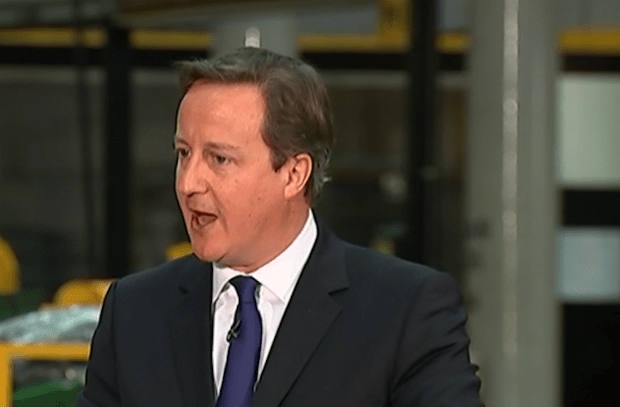David Cameron has just finished delivering his ‘game changing’ immigration speech. A lot of it was a narration of why immigration had made Britain the country it is, but why some voters were uncomfortable with it. You can read the full text here, but here’s the speech summarised in five quick points:
1. Cameron set out an optimistic vision of immigration in the UK
The Prime Minister deliberately talked at length about the benefits migrants have brought to this country for many years and Britain’s history as an open, outward-looking country. He spoke of the contribution of Ugandan Asians to Britain and the fact that the NHS, the city, universities and other institutions rely on the work of migrants. ‘This is modern Britain,’ he said. ‘A country that has come out of recession to become the fastest growing advanced economy in the world. That has happened in party because we are an open nation.’ He attacked those who thought ‘our nation can withdraw from the world and somehow all will be well’, saying this was a ‘dangerous and misguided view’.
That he only focused at length on the problems with immigration later in the speech showed that the Prime Minister wanted to make this an upbeat speech seeking to tweak the system rather than a miserable one asking to stop the world.
He also went through what the government had already done to address some of the fears from voters that immigration was out of control. This will please those in his party who worry that the current debate ignores how much the Conservatives have already achieved.
2. Immigration is now part of the Tory long-term plan
Ukip didn’t get a mention by name in the speech but they were clearly on the PM’s mind as he talked about those who held a ‘dangerous and misguided view’ and urged voters to ‘distrust those who sell the snake oil of simple solutions’. But Cameron also attacked Labour at length, primarily by folding immigration into the ‘long-term economic plan’ that now already encompasses the NHS. He started his speech by saying ‘just as this government has a long-term plan for where we are taking our country, so within that we have a long-term plan for immigration’. Then later he said that ‘any politician who doesn’t have a serious plan for welfare and education, has no sensible long-term plan for controlling immigration’. The pitch at the general election will clearly be that Labour cannot promise anything on any area until it proves it has a serious long-term economic plan.
3. The Prime Minister doesn’t want to leave the EU
He didn’t say anything like that, of course. He talked about ‘absolute requirements’ in his renegotiation of Britain’s relationship with Europe and for the need for reform across the EU. He concluded by saying he would rule nothing out if he failed:
‘If I succeed, I will, as I have said, campaign to keep this country in a reformed EU. If our concerns fall on deaf ears and we cannot put our relationship with the EU on a better footing, then of course I rule nothing out. But I am confident that, with goodwill and understanding, we can and will succeed.’
But Cameron also said his measures do ‘not mean a closed-door regime or a fundamental assault on the principle of free movement’. This decision to rule out fundamental reform of migration in the EU shows that Cameron does not want to make a promise that EU leaders have said he cannot keep because they will not undermine the principle of free movement as a cornerstone of the European Union. He does not want to end up campaigning against Britain’s membership of the EU and therefore does not want to promise anything that would lead him to do so. There is no emergency brake, no points-style system.
Instead, his red line is reform of access to benefits for migrants. Those who want to claim tax credits and child benefits will have to live and work in Britain for at least four years. Migrants whose children live abroad will not claim child benefits or child tax credits. You cannot be eligible for a council house unless you have been here for at least four years. Cameron wants to brand the welfare system as ‘a national club’ that people pay into before they take out from.
He also announced a fund for communities to ‘meet the additional demands on local services’.
4. Cameron defended the net migration target
There is no way the Prime Minister could have produced a serious speech that ignored yesterday’s figures showing the Conservatives will not meet their target to drive net migration down into the tens of thousands. He would have been asked about it in questions afterwards anyway (and it was Nick Robinson’s first question to him once he’d finished speaking). He said he thought the target was ‘worthwhile’ but that he accepted the ‘logic’ of the argument about the numbers of people emigrating each year and therefore the government would make it easier for people to chart the progress on the scale of migration from outside and from within the EU.
5. An appeal to European leaders
This was primarily a speech aimed at Tory backbenchers and voters toying with voting Ukip. Cameron made a direct appeal at the end to voters to elect him as Prime Minister. But he did turn to the people who will grant what he’s demanding today. Cameron told EU leaders that the British people ‘will not understand – frankly I will not understand – if a sensible way through cannot be found, which will help settle this country’s place in the EU once and for all’. He appealed to them to help Britain stay in the EU because of the benefits the country brings to the bloc.







Comments